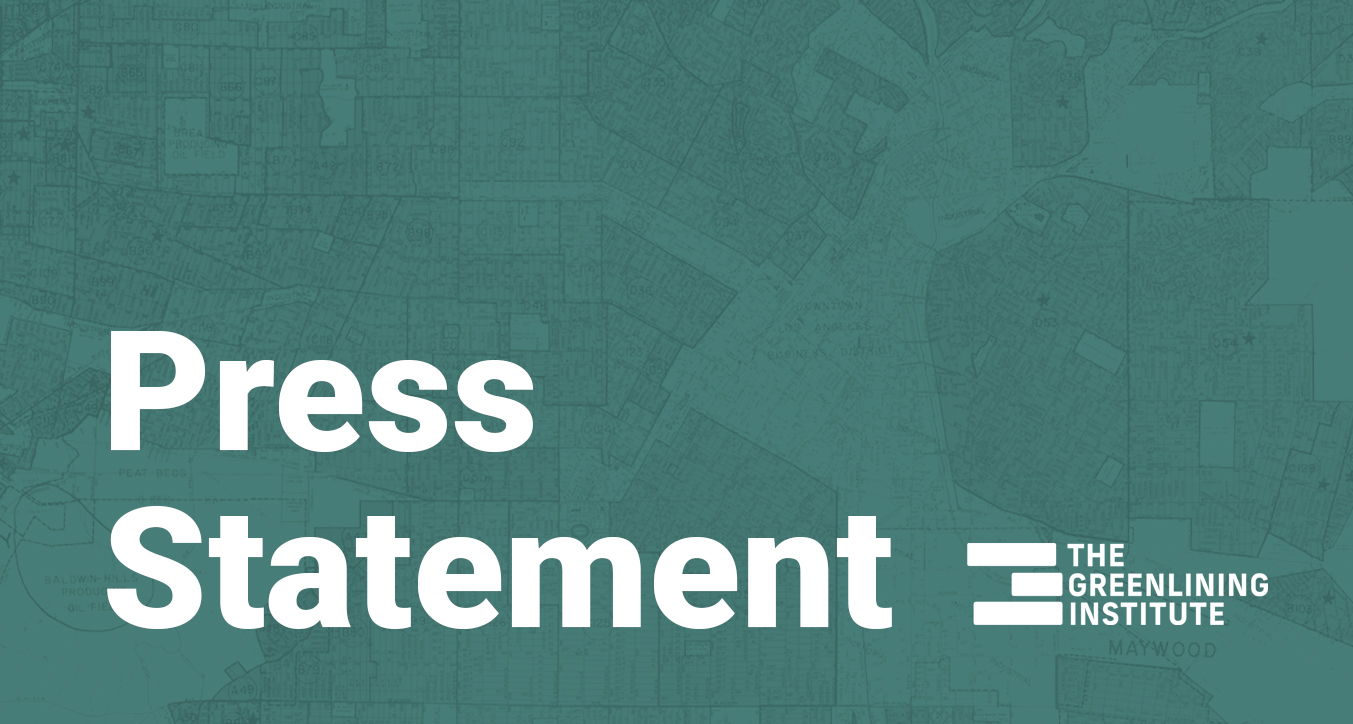Building Towards Equity: Our 2023-24 California Legislative Agenda

From the worsening climate crisis, to the rise of AI-driven decision-making, California is at the forefront of some of the most pressing challenges the world faces today. As we enter the first year of a two year legislative cycle, we are ready to meet these challenges head-on.
Our legislative work in California and beyond is future-focused — the policies we pass are the building blocks of transformative changes that will ultimately lead us to a more equitable system.
Instead of focusing on how policy can inflict the least amount of harm, we demand policies that create tangible benefits for communities of color. We demand policies that acknowledge the legacies of harm in California and beyond, and intentionally seek to reverse that harm. We demand greenlined policies.
California consistently serves as a leading example of influential, progressive decision-making, setting an example for the rest of the nation on what equitable policy can look like. When it comes to Greenlining’s state-level policy work, we take California’s role as leader seriously. We invite legislators to join us in this work.
For the latest on our legislative agenda, please visit our landing page.
2023-24 Co-Sponsored Legislation
Each of our co-sponsored bills serve a critical purpose in ensuring California’s systems and institutions offer transparency, accountability, commitment, and access to communities of color, low-income communities, and communities that have been historically ignored or marginalized by state policies. These bills are the building blocks for an abundant future and will move us towards more equitable solutions to the immense issues we face today, and beyond.
Assembly Bill 302 (Assemblymember Chris Ward) – State ADS Inventory Act
California’s institutions increasingly rely on automated decision systems to make critical determinations that impact our day-to-day lives. This includes decisions – made by algorithms and artificial intelligence – about who can access social safety net programs, who gets parole, and how to collect taxes.
This technology has the potential to improve efficiency, accuracy, and transparency. However, these systems are still new and evolving, and can have deficiencies that lead to unfair, biased, and inaccurate results, causing disproportionate harm to low-income families and communities of color while also undermining trust in the public sector.
AB 302 authorizes the California Department of Technology to conduct a comprehensive inventory of all high-risk Automated Decision Systems used by state agencies. The inventory will identify the decisions these systems make or support, the potential benefits of these systems and the measures taken to reduce the risk of inaccurate, unfairly discriminatory, or biased automated decisions. State agencies, elected officials, and Californians need this information to understand the benefits and risks of government ADS and to provide proper oversight over these critical systems.
Senate Bill 253 (Senator Scott Wiener) – Climate Corporate Data Accountability Act
Corporate emissions contribute to over-polluted communities and deadly climate outcomes from harsher wildfire seasons to historic storms and floods. The worst of these impacts disproportionately fall on communities of color and low-income communities.
SB 253, The Climate Corporate Data Accountability Act, requires US-based corporations with operations in California and annual gross revenue of $1 billion USD or greater to disclose their full greenhouse gas (GHG) emissions footprint to the public. Research has found that corporations have an outsized impact on our climate due to excessive GHG emissions. The disclosure required by SB 253 allows the public to hold corporations accountable for their role in the climate crisis.
With The Climate Corporate Data Accountability Act, California would be the first state in the nation to demand climate pollution transparency, recognize the right of communities to know how and if corporations are working to reduce their emissions, and address the importance of verifying corporate claims of sustainable leadership.
Assembly Bill 1525 (Assemblymember Mia Bonta) – Equity Carve Out for Transportation Funding
Communities of color disproportionately face exposure to transportation-related air pollution, longer commute times, and a lack of access to safe infrastructure and reliable mobility options due to decades of deliberate discrimination and systemic disinvestment. While the State’s transportation agencies have put forth a range of equity initiatives, the persistence of harmful development and inadequate investment in California’s low-income communities and communities of color signal a need for greater reform.
AB 1525, The Equity First Transportation Funding Act, requires that a minimum of 60 percent of all eligible transportation dollars be allocated to projects that are located in and provide benefits to “disadvantaged” communities, as defined by the State. The Act would also require that all proposed projects are evaluated to ensure they provide benefits and avoid harms in disadvantaged communities. This bill will help ensure that crucial investments flow to communities with the greatest needs, while the evaluation process is designed to protect communities from further harm.
California’s existing climate programs, like the Active Transportation Program, demonstrate the power and potential of establishing equity targets and a project evaluation process, but the absence of a clear, uniform mandate across the transportation sector limits California’s ability to meet our climate and equity goals. AB 1525 can help the state begin to repair the harms of our transportation system’s impact on communities of color.
Assembly Bill 591 (Assemblymember Jesse Gabriel) – Electric Vehicle Charging for All Act
Communities of color and low-income communities disproportionately bear the consequences of climate change, yet have been the last to benefit from California’s clean transportation transition. This is driven by deliberate disinvestment resulting in a lack of infrastructure in the areas they live and work. Not only are these communities isolated from the health and economic benefits of clean transportation, but they also tend to live in the most polluted neighborhoods with the fewest mobility options leading to an overreliance on gas-powered vehicles and worse pollution-related health outcomes.
AB 591, The Electric Vehicle Charging for All Act, requires that all electric vehicle charging stations must be accessible to all electric vehicles. This bill ensures that California’s charging infrastructure functions with all EV models, and not just luxury EVs that are out of reach of the majority of Californians. The Electric Vehicle Charging for All Act, is an opportunity for California to make electric mobility more accessible and ensure EV infrastructure is available to everyone in the state.
2023-24 California Budget Priorities
Governor Newsom’s 2023-24 California January Budget proposal previewed a rocky road ahead due to lower-than-anticipated state revenues and ongoing economic uncertainty as the threat of a recession grows. California currently faces a $22.5 billion deficit, in stark contrast to the state’s historic $100 billion surplus last year.
As we have for the past three decades, The Greenlining Institute will continue to fight for initiatives that build resilience through economic shortfalls and instability.
To read more about key Budget investments we’re watching, please see our response to Governor Newsom’s January Budget proposal here.
Supported Legislation
In addition to our co-sponsored legislation, we intend to support legislation that aligns with our mission: to work towards a future where communities of color can build wealth, live in healthy places filled with economic opportunity, and are ready to meet the challenges posed by climate change. We will share more about our supported legislation in the coming weeks.
For more information on our legislative agenda, please reach out to melanie.morelos@greenlining.org.




